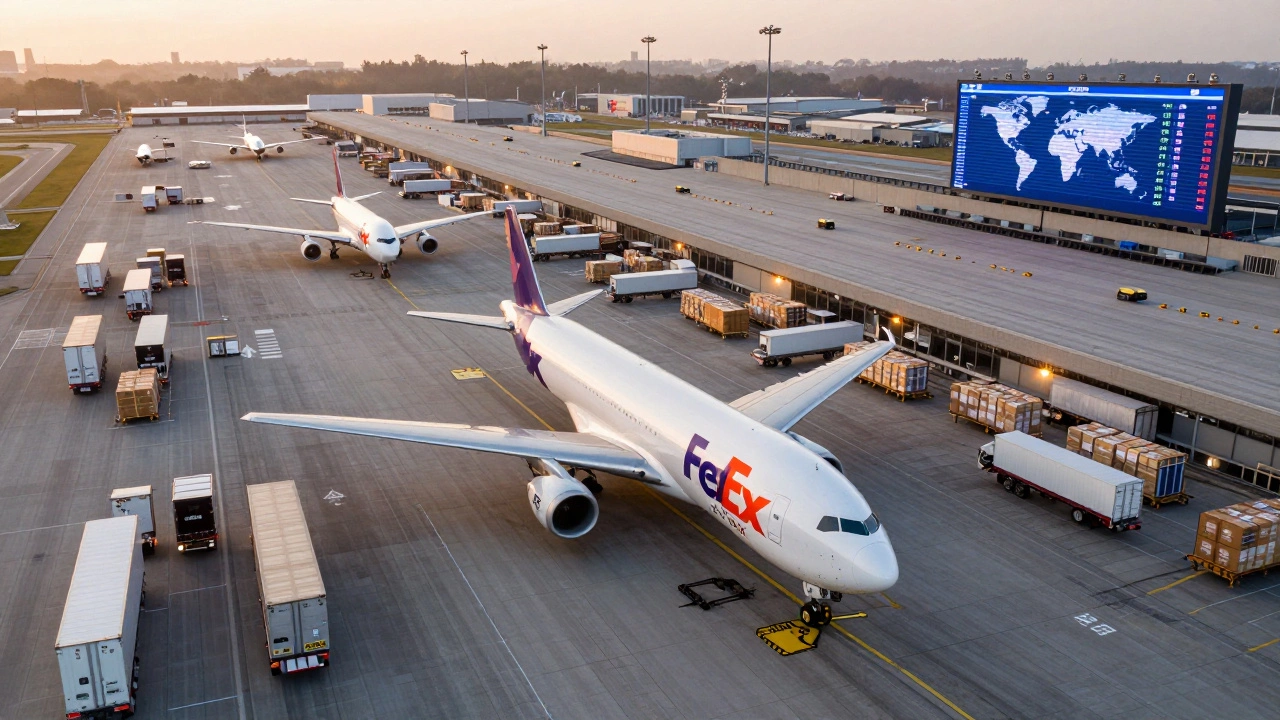All About FedEx: Shipping Tips, Platform Updates, and How It Stacks Up
If you’re looking for quick, reliable delivery in the UK, FedEx is a name most people recognize. But the service offers more than just overnight parcels. Below you’ll find the basics on how FedEx works, what its logistics platform can do for your business, and where it stands against the competition.
FedEx Logistics Platform – What It Offers
The FedEx Logistics platform is a cloud‑based hub that gives you real‑time visibility over every shipment. You can create shipments, track them, and pull analytics without leaving the dashboard. The interface is clean – you click a few buttons, add a package weight, pick a service level, and you’re set. For e‑commerce stores, the platform can automatically pull order data and generate shipping labels, cutting manual work in half.
Another handy feature is the integration with major warehouse systems. If you already use a WMS, the FedEx API can sync inventory levels, so you never ship what you don’t have. The platform also supports customs paperwork for international moves, meaning you won’t have to jump between multiple sites to clear a shipment.
Pricing on the platform is transparent. You see the exact rate before you confirm, and any discounts for volume show up automatically. That helps small businesses avoid surprise fees and gives larger shippers a clear view of cost savings.
FedEx vs Other Couriers – Which Is Faster and Cheaper?
When you compare FedEx to USPS or UPS, a few things stand out. FedEx typically beats USPS on speed for overnight and international express services. USPS can be cheaper for lightweight parcels under 1 kg, especially with its 2‑day priority option. However, FedEx offers more consistent tracking, which many users prefer for high‑value items.
Cost differences often come down to service level and package size. For a standard 5 lb box shipped next day, FedEx’s Express Saver can be about 10‑15 % pricier than USPS Priority Mail Express, but you get a guaranteed delivery window and fewer hidden surcharges. UPS sits somewhere in the middle – its rates match FedEx for larger boxes, and its network covers more remote areas than FedEx does in the UK.
Another factor is reliability. In surveys, FedEx scores higher for on‑time delivery than both USPS and UPS, especially for time‑critical shipments. If you’re sending medical samples, legal documents, or high‑value electronics, that reliability can justify the extra cost.
To pick the right courier, list your priorities: speed, price, tracking detail, or coverage area. Then run a quick rate check on each provider’s website for your typical package. Most businesses end up using a mix – FedEx for urgent or high‑value shipments, USPS for cheap, low‑risk parcels, and UPS for bulky freight.
Beyond rates, think about customer service. FedEx provides a 24/7 hotline and live chat, which can be a lifesaver if a shipment goes missing. USPS relies more on local post office support, which can be slower to respond. UPS offers similar support levels but sometimes routes calls through an automated system.
In short, FedEx is a solid choice when you need speed and visibility. Pair it with the logistics platform to automate routine tasks, and you’ll save time while keeping customers in the loop. Keep an eye on seasonal promotions – FedEx often rolls out limited‑time discounts that can bring the price gap closer to USPS.
Whether you’re a small e‑shop or a growing wholesale operation, understanding these nuances helps you cut costs without sacrificing service quality. Use the insights above to decide when FedEx is the best fit and when another carrier might win the day.
Who Is the Biggest Logistics Company in 2025?
FedEx is the biggest logistics company in 2025 by revenue, but UPS and DHL lead in volume and global reach. Learn how the top carriers compare and which one suits your shipping needs.
Best Mail Carrier for International Shipping: How to Choose Right
Figuring out which mail carrier to use for international shipping can be stressful. This article breaks down the pros and cons of major carriers like USPS, DHL, FedEx, and UPS, focusing on price, speed, reliability, and coverage. Get real-world tips that help you avoid expensive mistakes. Understand what actually matters for different situations. Make an informed choice that saves you time and money.
Choosing Between UPS and FedEx for Express Delivery
Deciding between UPS and FedEx for express delivery can be a conundrum. Both giants offer fast and reliable services, but understanding their differences is key. This guide dives into their strengths, pricing models, and the value they bring to different shipping needs. Ease your decision-making with practical insights and tips.
Is FedEx a 3PL or 4PL Service?
FedEx, a global powerhouse in logistics, blurs the line between traditional 3PL and modern 4PL services. This article delves into whether FedEx acts as a third-party logistics (3PL) provider or has transcended into a fourth-party logistics (4PL) role, offering integrated supply chain solutions. We explore interesting facts about their operations and provide tips for businesses looking to leverage these services. We also shed light on how advanced logistics software is reshaping these roles.
Is FedEx Actually a Freight Forwarder?
The article explores whether FedEx, a well-known logistics giant, functions as a freight forwarder. It highlights the roles and services typically provided by freight forwarders and compares them to the services offered by FedEx. Additionally, it delves into FedEx's capabilities in global shipping and cargo management, providing insights into how they align or differ from traditional freight forwarding. Readers will gain a clear understanding of FedEx's position within the logistics and shipping industry.
Is FedEx the Most Cost-Effective Option for International Shipping Compared to UPS?
Exploring whether FedEx offers a more economical choice for international shipping compared to UPS involves considering various factors such as service fees, delivery times, and customer satisfaction. Understanding these elements can help businesses and individuals make informed decisions about their shipping needs. We'll delve into the features and pricing structures of both FedEx and UPS to provide a clearer picture of what to expect regarding international deliveries. This article will offer useful insights for anyone looking to navigate the world of international shipping with these two major carriers.
Is FedEx a Logistics Leader?
FedEx is widely recognized as a logistics company, offering a variety of services that reach beyond simple parcel delivery. With an expansive global network, FedEx provides solutions in shipping, freight, and supply chain management. Often perceived as a mere courier service, the company's infrastructure and expertise make it a leader in the logistics sector. Understanding FedEx's capabilities helps grasp its impact on global trade and distribution. This piece explores FedEx’s logistics scope and why it matters.
© 2026. All rights reserved.







